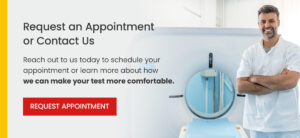
For many people, sitting for a medical scan is the easy part — the hard part is waiting for the results. If you find yourself in that situation, you’re not alone. Anxiety over medical scans, sometimes called scan anxiety disorder or “scanxiety,” can create a lot of stress, especially if you have scan anxiety for cancer-related imaging. Fortunately, there are some things you can do to alleviate the worrying and get back to living your life.
Understanding Imaging Tests and Their Importance
Scanxiety can show up after any kind of imaging test, such as a CT, PET, MRI or X-ray scan. These tests are necessary for making accurate diagnoses based on what’s happening inside your body. While they might be stressful, they’re crucial for your ongoing health. These results can help you get treatment faster and start feeling better. Early detection is often vital to a good outlook. Your doctor wouldn’t order imaging tests unless they were necessary.
With that said, it’s easy to feel like your doctor only ordered a test because they expect to find something or they already have a diagnosis in mind. The truth is that providers often need to order imaging tests to rule something out or to cover their bases by being exceptionally careful. Try to avoid jumping to conclusions before or after a scan.
Practical Tips to Manage Anxiety Before and After Imaging Tests
The best thing to do after a CT scan, PET scan or another medical test is to minimize stress in whatever way works for you. Whether you’ve already had your scan or you’re preparing for one, try these strategies to reduce or prevent stress.
1. Distract Yourself
A great way to reduce scanxiety is to stay busy. Don’t give your brain time to worry. Instead, find a good book, a craft project, a video game or something else to keep your mind busy.
2. Meditate or Do Breathing Exercises
A different approach would be to slow things down. Meditation and breathing exercises are both excellent options for clearing your mind. Just a few minutes of tranquility can help you feel calmer for the rest of the day. If you’ve never meditated before, try a guided meditation or a walkthrough on different breathing exercises. You can find many videos and apps to walk you through the process.
3. Talk to Someone
Remember, these feelings are perfectly normal. You may feel better after talking about them with someone you trust. You could talk to a friend, a family member or a counselor. You might also talk to other people in a similar situation, such as in virtual or in-person support groups. If you don’t already belong to such a group, try talking to your provider. They can likely connect you with helpful resources and clear up any concerns you might have.
Consider talking to a mental health professional if you have severe anxiety over medical tests.
4. Get Moving
Exercise is a great way to combat anxiety from a medical scan. Do whatever makes you feel best, whether that’s a run, some swimming, a walk through the neighborhood or some gentle yoga. Movement can help ground you while promoting your health.
5. Know How You’ll Get Your Results
Waiting for a scan often makes people nervous about the unknown. Give yourself as much information as possible by determining how and when you’ll get your results. You can ask your provider during or before the scan or call the office afterward.
Find out whether you’ll get the results by phone, email or at an in-person appointment, and ask when you can expect them. This information can help you feel more in control to reduce stress.
6. Treat Yourself

Be gentle with yourself during the time you wait for your results. Treat yourself to something you love, like a meal at your favorite restaurant or a nice massage. Having something fun to look forward to can help take your mind off the waiting.
7. Avoid the Internet
Don’t let yourself fall into a medical rabbit hole. It’s easy to get overwhelmed with potential diagnoses, but try not to aggravate your worries with this approach. Remember, this information isn’t always complete or accurate online. Your provider will tell you what’s going on in due time. If you have any questions before then, you can always reach out to them.
8. Try Journaling
Many people find that journaling gets their thoughts out of their heads and onto paper. Grab yourself a nice notebook and pen, or open up a blank document on your computer and write down whatever thoughts come to mind.
9. Stick to Your Routine
If you can, keep your routine as normal as possible. It can help you stay grounded and connect you to other people. Even small interactions like checking out at the grocery store or saying hello to a neighbor can go a long way in making things feel normal.
10. Keep a Positive Mindset
Having a positive mindset might seem much easier said than done, but positive thinking is a skill you can build. Instead of thinking the worst, remind yourself you’re getting this scan to improve or maintain your health and take action. It might also help to practice gratitude. Take a moment to appreciate the supportive, loving people in your life and your access to quality health care.
Common Questions About CT Scan Anxiety
CT scans are one of the most common types of imaging tests, so we’ve compiled an FAQ on some popular questions you might have about your scan.
Do You Feel OK After a CT Scan?
Physically, you should not feel any symptoms after a CT scan, assuming you don’t have a reaction to the dye. The person performing the scan should monitor you for any allergic reactions while you’re at the office. You can resume normal activities after you leave, although you might be told to drink plenty of fluids to help flush the dye out of your system.
Can CT Scan Contrast Cause Anxiety?
CT scan contrast dye typically doesn’t cause anxiety on its own, but the experience of going through the test and waiting for the results can certainly make you feel anxious.
Are There Negative Side Effects of CT Scans?
The potential side effects of a CT scan are typically mild and related to the contrast used. If you received a barium solution for contrast, you may have some constipation and/or chalky stools for a few days. Other solutions usually clear out of your system in a day or two and won’t cause any symptoms.
There is always the risk of an anaphylactic allergic reaction to the contrast dye, but these responses are extremely rare. They would typically include symptoms like shortness of breath, hives, a rapid heartbeat, facial swelling and impaired breathing. If this reaction occured, your care team would begin treatment immediately.
What Can a Patient Expect After a CT Scan?
Aside from the potential side effects of contrast dye, your post-scan experience should be relatively simple. You can go home shortly afterward and resume normal activities. You should hear back about the results within a day or two.
Request an Appointment or Contact Us
Another major part of reducing scan anxiety is working with an attentive, skilled provider. If you’re in South Florida, the Impressions Imaging team is here to help from our Boca Raton or Tamarac locations. We take the time to make your experience as comfortable as possible and minimize the wait. We work quickly to get you in sooner and return reports within 12-24 hours, all interpreted by world-class technologists and radiologists. If you have any questions, we’re here to answer them.
Reach out to us today to schedule your appointment or learn more about how we can make your test more comfortable.



